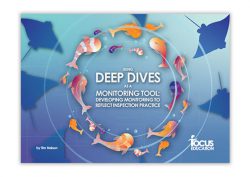
Following Ofsted’s lead, many school leaders have adapted their monitoring of teaching to now judge the impact teachers have over time, rather than grading individual lessons.
However this can lead to a lack of clarity and understanding of what to actually look for when observing lessons.
The following tips may prove useful for school leaders when watching teaching and learning in the classroom:
1 – The What & Why
Ask the children what they are learning and why they are learning it.
Children should be able to answer this at an age appropriate level e.g. ‘We are practising sketching because we are going to draw landscapes next week and then paint them.’
These questions are the acid test of the effectiveness of learning objectives.
Ultimately, do the children actually understand the ‘what’ as well as the ‘why’?
2 – Is it the Norm?
Ask the children if what you are observing is typical or normal.
The children will soon tell you if anything is too different from the norm!
3 – Monitoring Teaching Over Time
What do the children do if they are stuck?
If their first reaction is to put their hand up and wait for an adult, then all the work the school has done on learning behaviours may not have been all that effective.
However if a child does show independence and resilience by, for example, finding and trying other resources, then this is strong evidence of the impact of the work the teacher has done in promoting an effective learning behaviour.
4 – Teacher’s Standards
Refer what is being observed to the Teacher’s Standards.
This is a useful reference point when feeding back to staff and underpins appraisal systems anyway.
You may find it useful to link each standard to practice over time and to the Ofsted grades, as I outline in Judging Teaching, not the Teacher and Judging Early Years.
We also provide next step developments towards each standard and questions for leadership to consider, helping to ensure that the setting has policies and support in place to enable teachers to meet each of the standards.
5 – Age Expectations
Refer the learning in the lesson and the preceding evidence shown in the children’s books to the relevant programmes of study for the age of the class.
- Is learning based on the age expectations?
- Does current learning fit into the bigger picture of the end of year and the end of key stage expectations as prescribed by the National Curriculum?
- Does it support the expectation that the majority of pupils will meet the expectations? If not, why not?
6 – Passing the Dentist Test
Although we are not grading lessons individually, one method I use to evaluate the progress made by children when observing a lesson is to apply what I call the ‘dentist appointment test’.
Towards the end of a lesson I consider a hypothetical child who arrives late because they have been to the dentist, just as the teacher is bringing the lesson to a close:
- Consider what they have missed.
- What hasn’t the child learned, become better at or applied in context?
Effective teachers pass the dentist appointment test every time; they know children cannot get a single hour back, so every lesson is valuable and they make sure the children consistently learn well.
For teachers who are not as effective over time a child may as well go to the dentist (as long as it isn’t painful! I may have a background in inspection work but I’m not totally sadistic, honestly); that’s because they probably would have actually learned more from the experience of going to the dentist than sitting through another lesson where their needs are not being met.
7 – SMSC
Check for evidence of the pupils’ SMSC development and also for the promotion of British values. Of course, these won’t be seen as explicit in every lesson, but effective teachers integrate aspects of spiritual, moral, social, and cultural development into their teaching, often without perhaps realising it in those terms.
For example, try finding a teacher who doesn’t discuss with their class why the Rainbow Fish doesn’t have friends at the beginning of the story and then does have friends at the end. They probably didn’t intend to use that story as a moral and social development learning objective, but it happened and it had a considerable impact on the children.
This should be recognised in observations and fed back as a positive acknowledgement to the teacher involved.
8 – Understanding Feedback
Ask the children to explain recent marking and feedback from their books. The acid test of any marking policy is can the children read it, understand it and act on it?
Ask the children if and when they are able to act on feedback. How does it help them learn and improve? And note how the children receive feedback during the lesson.
Look at it from a child’s point of view: do adults let me know what I did well and how I can improve?
9 – Whole Subject Approach
Look for examples of basic skills being developed across all subjects and note these for inclusion in feedback.
Children are usually well aware of how they use their writing in other subjects and how they often read books in other subjects, but their perception of maths is often limited to it being what they do between 9.30 am and 10.30 am in the morning, with maybe a few graphs and tables in their science books.
Look for teachers making clear references to the use of maths in other subjects such as PE, DT and computing.
It’s amazing how many primary practitioners can miss opportunities for the development of children’s understanding of numbers.
Some of us can even make very obvious mistakes when dealing with basic numbers ourselves…
Get in Touch
If you still have questions about monitoring teaching over time or want to talk about different options get in touch with the Focus Education office on 01457 821 818.
Related Publications
Using Deep Dives as a Monitoring Tool: Developing Monitoring to Reflect Inspection Practice
by Tim Nelson
Price | eBook £25.00 | Book & eBook £35.00
Tim has been a headteacher with a successful track record; his last school had a reputation for innovation and their initiatives have been utilised by others and presented internationally.
School improvement has been at the heart of his career, working as an LLE, a School Improvement Partner, Professional Partner as well as an Ofsted inspector and mentor for trainee inspectors.







